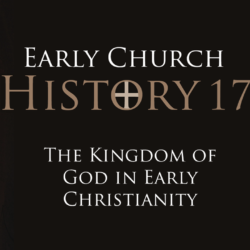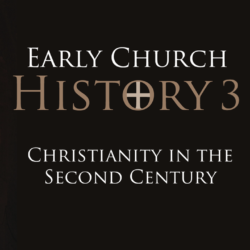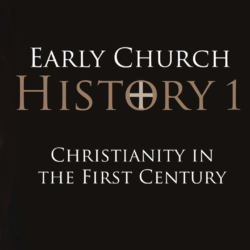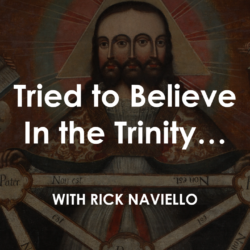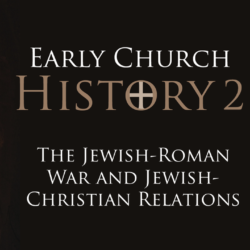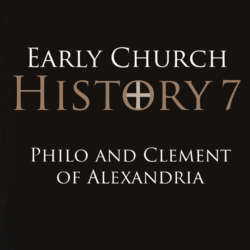This is part 16 of the Early Church History class.
Jerome and Augustine are two of the most influential Latin Christians of the first millennium of Christianity. This episode will introduce you to their lives, personalities, and some of their most important ideas. You’ll see how significantly asceticism affected their lifestyles as well as how their particular take on Christianity came to set the norm for Roman Catholic Christianity.
Listen to this episode on Spotify or Apple Podcasts
—— Links ——
- More Restitutio resources on Christian history
- See other classes here
- Support Restitutio by donating here
- Join our Restitutio Facebook Group and follow Sean Finnegan on Twitter @RestitutioSF
- Leave a voice message via SpeakPipe with questions or comments and we may play them out on the air
- Intro music: Good Vibes by MBB Attribution-ShareAlike 3.0 Unported (CC BY-SA 3.0) Free Download / Stream: Music promoted by Audio Library.
- Who is Sean Finnegan? Read his bio here
—— Notes ——
Jerome’s Life (347-419)
- Actual name: Eusebius Sophronius Hieronymus
- Excellent Latin education, highly intelligent
- Learned Greek and Hebrew
- Lived as a hermit in the Syrian desert
- 382-385 – served as secretary to Pope Damasus I, bishop of Rome
Jerome’s Asceticism
- Believed everyone should be celibate
- Worked a lot with wealthy widows from the senatorial class and their daughters
- Thought the only benefit from marriage was the production of more virgins
- After Paula’s daughter Blaesilla died, he moved to Bethlehem.
- Spent his time engaging in controversies by letter, translating the Bible and other literature into Latin, and writing commentaries on scripture
Jerome’s Writings
- Though deeply influenced by classical literature, especially Cicero, he advocated reading only the Bible and Christian literature.
- Worked on the Vulgate (382-405)
- Became the dominant Latin Bible for the Roman Catholic Church from 600 onwards; though in Jerome’s day, many still preferred a translation of the Septuagint (including Augustine)
- Translated Origen’s On First Principles, Pachomius’ Rule, and Eusebius’ Historical Chronicle into Latin
- Lives of Illustrious Men provides short biographies of many early Christians.
- Commentaries on many books of the Bible
Augustine’s Early Life (354-430)
- Grew up in North Africa with a Christian mother, Monica, and a pagan father, Patrick
- Had an excellent education in Carthage
- Particularly influenced by Cicero’s dialogues, especially his Hortensius
- Became a teacher of rhetoric in Rome, then Milan
Augustine’s Sexual Life
- Stealing pears as a teenager
- “I was burning to find satisfaction… I ran wild in the shadowy jungle of erotic adventures.” (Confessions 2.1.1)[1]
- At Carthage, he said, “All around me hissed a cauldron of illicit loves.” (Confessions 3.1.1)
- Took a concubine from a lower class and lived with her for 13 years and had a son with her, Adeodatus
- His mother convinced him to send his concubine away so he could be eligible to marry a well-born woman.
- Couldn’t live chastely in the interval and took another concubine
Augustine’s Journey to Christianity
- Had encountered the scriptures but said they “seemed to me unworthy in comparison with the dignity of Cicero” (Confessions 3.5.9)
- Became a Manichaean for 9 years
- Believed in Astrology for a long while
- Found great satisfaction in Neo-Platonism, especially the writings of Plotinus and Porphyry
- Checked out Bishop Ambrose just to listen to his rhetoric and was impressed
- Heard a voice saying, “Pick up and read [tolle, lege]” and opened to Romans 13.13-14
- 387 – Ambrose baptized Augustine and Adeodatus
Augustine’s Bishopric (395-430)
- Became bishop of Hippo Regius and served for 35 years
- Preached regularly, held court twice a week, counselled people
- Engaged in many controversies with Manichaeans, Donatists, Pelagians, and pagans.
Augustine’s Writings
- Wrote approximately five million words
- Confessions: an autobiography
- City of God: responds to Alaric’s sack of Rome in 410 as well as lays out extensive interpretation of the Bible and key doctrines
- On the Trinity: defended the Trinity and explained it philosophically
- Also, many letters, commentaries, and treatises
Augustine’s Thought
- Original sin passed down a corrupted nature incapable of doing good.
- God predestined the elect to be saved.
- The elect go to heaven to live eternally.
- The damned go to hell to be tormented eternally.
Augustine’s Influence
- Probably the most influential Christian of the first millennium
- Codified Catholic doctrine that held sway throughout the Middle Ages
- Martin Luther was himself an Augustinian monk, and the Reformation was largely a return to Augustinian Christianity.
Review
- Jerome and Augustine were influential Christians who shaped Christianity in the fifth century.
- Both received excellent educations and voluntarily chose ascetic, celibate lifestyles.
- Both were influenced by Origen, especially his allegorical hermeneutic.
- Jerome’s translation of the Bible into Latin from Hebrew and Greek–the Vulgate–became the official Bible of the Roman Catholic Church.
- Augustine had a fraught and lengthy battle with lust that eventually led him to celibacy.
- Augustine was a Manichean, a believer in astrology, and a Neo-Platonist before he became a Christian.
- Augustine battled Manicheans, Donatists, Pelagians, and Pagans throughout his career.
- He advocated original sin, infant baptism, eternal life in heaven, eternal torment in hell, predestination of the elect, and celibate clergy.
- More than anyone else in the first thousand years, Augustine’s thought influenced Roman Catholic doctrine.
- To a degree, the Reformation itself was a return to Augustinian Christianity.
[1] All quotes from Confessions from Augustine of Hippo, Confessions, trans. Henry Chadwick (New York: Oxford, 1998).

